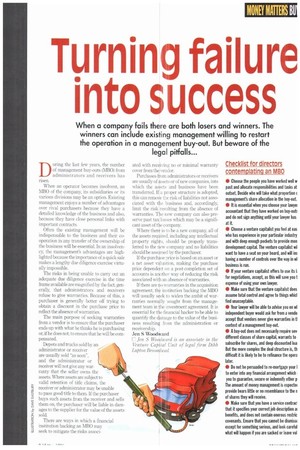Turning failure into success
Page 53

If you've noticed an error in this article please click here to report it so we can fix it.
When a company fails there are both losers and winners. The winners can include existing management willing to restart the operation in a management buy-out. But beware of the legal pitfalls...
Dtiring the last few years, the number of management buy-outs (MBO) from administrators and receivers has risen.
When an operator becomes insolvent, an MB() of the company, its subsidiaries or its various divisions may be an option. Existing management enjoys a number of advantages over rival purchasers because they have a detailed knowledge of the business and also, because they have close personal links with important contracts.
Often the existing management will be indispensable to the business and their cooperation in any transfer of the ownership of the business will be essential. In an insolvency, the management's advantages are highlighted because the importance of a quick sale makes a lengthy due diligence exercise virtually impossible.
The risks in being unable to carry out an adequate due diligence exercise in the time frame available are magnified by the fact, generally, that administrators and receivers refuse to give warranties. Because of this, a purchaser is generally better off trying to obtain a discount in the purchase price to reflect the absence of warranties.
The main purpose of seeking warranties from a vendor is to ensure that the purchaser ends up with what he thinks he is purchasing or, if he does not, to ensure that he will be compensated.
Depots and trucks sold by an administrator or receiver are usually sold "as seen", and the administrator or receiver will not give any warranty that the seller owns the assets. Where assets are subject to valid retention of title claims, the receiver or administrator may be unable to pass good title to them. If the purchaser buys such assets from the receiver and sells them on, the purchaser will be liable in damages to the supplier for the value of the assets sold_ There are ways in which a financial institution backing an MR0 may seek to mitigate the risks associ
ated with rvcei-,-1 1,-4 no or minimal warranty cover from the vendor.
Purchases from administrators or receivers are usually of assets or of new companies, into which the assets and business have been transferred. If a proper structure is adopted, this can remove the risk of liabilities not associated with the business and, accordingly. limit the risk resulting from the absence of warranties. The new company can also preserve past tax losses which may be a significant asset of the company.
Where there is to be a new company, all of the assets required, including any intellectual property rights, should be properly transferred to the new company and no liabilities should be assumed by the purchaser.
If the purchase price is based on an al-;:;et or a net asset valuation, making the purchase price dependent on a post-completion set of accounts is another way of reducing the risk associated with an absence of warranties.
If there are n1) warranties in the acquisition agreement, the institution backing the MW) will usually seek to widen the ambit of warranties normally sought from the management team in the investment agreement. It is essential for the financial backer to be able to quantify the damage to the value of the business resulting from the administration or receivership.
Jen S Woodward
Jen S nodward is an associate in the Venture Capital Unit of legal firm Dibb Lupton Broonthead.
Checklist for directors contemplating an MBO
• Choose the people you have worked well w past and allocate responsibilities and tasks at outset. Decide who will take what proportion management's share allocation in the nuy-out.
• It is essential when you choose your lawyei accountant that they have worked on buy-outi and do not sign anything until your lawyer has at it,
• Choose a venture capitalist you feel at eas who has experience in your particular Industry and with deep enough i pockets to provide mon development capital. The venture capitalist wil want to have a seat on your board, and will ins having a number of controls over the way in wl business is run, • If your venture capitalist offers to use its I, for negotiations, accept, as this will save you t expense of using your own lawyer.
• Make sure that the venture capitalist does assume total control and agree to things whicl find unacceptable.
• Your lawyer will be able to advise you on wl independent buyer would ask for from a vendo accept that vendors never give warranties in tl context of a management buy-out.
• A buy-out does not necessarily require sev. different classes of share capital, warrants to subscribe for shares, and deep discounted Mai But the more complex the deal structure is. th difficult it is likely to be to refinance the opera later.
• Do not be persuaded to re-mortgage your I to enter into any financial arrangement which you to guarantee, secure or indemnity other p The amount of money management is expecte( provide bears little or no resemblance to the n of shares they will receive.
• Make sure that you have a service contrac. that it specifies your correct job description ai benefits, and does not contain onerous restric covenants. Ensure that you cannot be dismiss( except fat something serious, and look careful what will happen if you are sacked or leave vol
















































































































